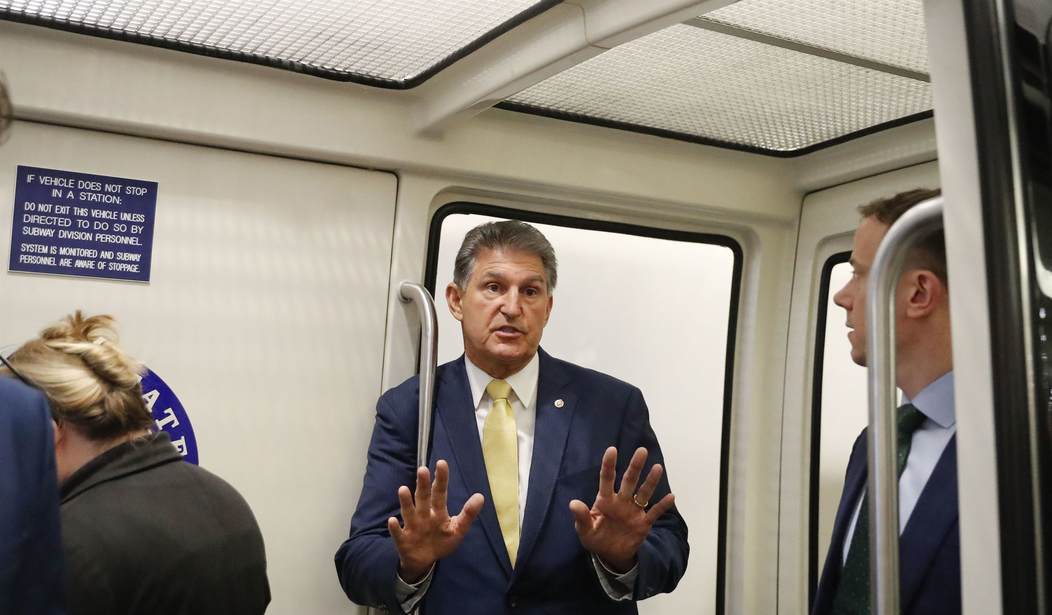Looks like Axios got this right in its snap analysis of Kyrsten Sinema’s reaction to the reconciliation deal announced late yesterday between Joe Manchin and Chuck Schumer. No one bothered to consult Sinema on the deal, Manchin revealed a few minutes ago to CNN’s Manu Raju, and no one has heard from her yet, either. Manchin thinks she’ll go along, but he’s not going to budge if she continues objecting to one component of the deal:
Manchin adds he's "not prepared" to lose tax on carried interest, which Sinema has been concerned about
— Manu Raju (@mkraju) July 28, 2022
For those unfamiliar with the carried-interest tax issue, the proposal will change the way income from investments get taxed. At the moment, carried interest gets taxed at capital-gains rates, which are significantly lower than income-tax rates. Carried interest income usually gets derived from economy-boosting capital investments, which had been the reason for taxing it at the capital-gains rate. The deal that Manchin and Schumer just cut will make that no different than ordinary income for tax purposes:
One of the tenets of the compromise is higher taxes on carried interest, which is a huge part of hedge fund managers’ pay but also applies to a performance fee for developers known as a “promote.” The senators’ plan would tax carried interest as ordinary income rather than as a capital gain, raising roughly $14 billion.
Other beneficiaries of carried interest include private equity and venture capital firms. A promote is a financial interest in the long-term capital gain of a development. Critics have long argued that income that does not result from risk-taking, such as the 2 percent of assets under management that hedge funders typically collect.
Manchin, citing inflation, has been balking at a package of climate change measures and tax increases, denying Senate Democrats the 50th vote they need to pass legislation without Republican support. In a statement, Manchin expressed support for eliminating the favorable tax treatment of carried interest, which is not a significant source of income in his state, West Virginia.
That might be true in West Virginia, but it’s probably not true in Arizona, where more of those investors may be living. Sinema has consistently opposed this change, whether because of its impact on constituents or just the overall impact of the economy. Given that the class of VC execs and hedge-fund managers tend to be more Democrat these days, it might well be a blend of both.
Taxing these functions at the income-tax rate will have a disincentivizing impact on those choices, although how much remains to be seen. That’s also true of the supposed revenue from this effort, which is almost certainly a static estimate. The people who benefit most from the current carried-interest tax policy likely have many options to shelter their capital from that kind of taxation, some of which will mean less capital for projects that stimulate economic growth. This policy change is curious at any time, but even more so as we enter a recession — where capital investment will be needed most. At any rate, a good portion of that ten-year revenue of $14 billion will likely be vaporware.
Nor is that the only tax issue Sinema will likely have with this reconciliation deal. As Axios notes, she has supported the idea of a corporate minimum tax, but that was before we went into a recession:
Between the lines: Sinema was on record last December supporting the 15% corporate tax rate, which will raise an estimated $313 billion to fund the Democrats’ climate priorities.
But that was before inflation took off and constant chatter about a potential recession subsumed Washington. …
And throughout the spring, Sinema shared and encouraged the view that Build Back Better — and any corporate tax increases — was dead.
How does she feel today, however? We still don’t know … and neither do her Senate colleagues. Schumer held a snap caucus meeting, and guess who didn’t show up?That doesn’t look like a good sign, but it’s not necessarily a negative signal either.
Sinema now has to decide whether to go along on a policy she opposes — and which will actively damage efforts to boost the economy — just to be a team player for Joe Biden and Chuck Schumer. The sacrifice might be even bigger than that for Sinema, however:
NEW, thread 🧵: Dems may have to sacrifice gay marriage bill for reconciliation
There’s concern among Senate Dems the Manchin/Schumer reconciliation bill will impact possible Senate R votes for gay marriage.
— Jacqui Heinrich (@JacquiHeinrich) July 28, 2022
Schumer’s office maintains leadership was not ready to bring gay marriage up for a vote because support to pass isn’t clear yet.
— Jacqui Heinrich (@JacquiHeinrich) July 28, 2022
Yeah, so both Schumer and Manchin shivved Sinema on one of her priorities. That may well play into just how enthusiastic she’ll be in overlooking the dumb carried-interest change.
And here’s one last thought: what if Manchin agreed to that change in the knowledge that Sinema would end up torpedoing the compromise? It’s an interesting thought, and normally one I’d treat very skeptically as it would essentially take a craven way out for Manchin of progressive ire. With all of the surprising double-dealing taking place among Senate Democrats, it seems a little more plausible … if only a very little more.
Addendum: It may take a week or two before we find out what Sinema thinks, too:
Could be a bit before we hear from Sinema on the Manchin/Schumer deal. Her office says “we aren’t going to have comment because Kyrsten is reviewing the text, and she’ll need to review what comes out of the parliamentarian process.”
— Burgess Everett (@burgessev) July 28, 2022
That doesn’t sound like outright opposition, but it doesn’t sound enthusiastic either.








Join the conversation as a VIP Member